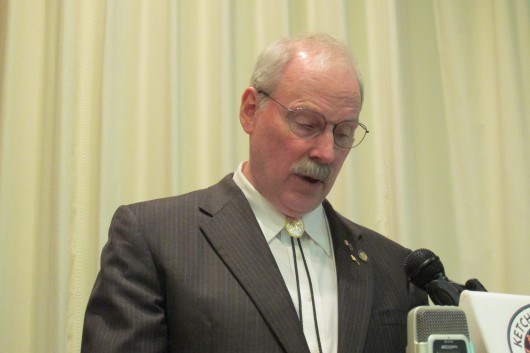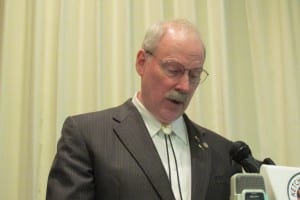Republican Senator Bert Stedman says the State Senate will likely agree to budget additions submitted by the Alaska House as a conference committee continues to grapple with budget negotiations. But legislators still remain at an impasse and likely will not reach an agreement soon. Stedman spoke at Wednesday’s Greater Ketchikan Chamber of Commerce lunch.
Stedman shared his disappointments and concerns about the current fiscal crisis and inability of the Legislature to finalize a multi-billion dollar state budget. He also spoke about challenges ahead for Southeast communities as well as the rest of the state.
Stedman gave an overview of the status of budget negotiations. A six-member conference committee, made up of three members from the Senate and three from the House, is trying to come to an agreement, but as of story deadline, no progress was reported.
Stedman says the House Minority proposed a list of items it wants added back into the operating budget. They include education funding, additional money for the Alaska Marine Highway System, and funding for social services among others. Stedman says the Senate will likely agree to the additions totaling about $15 million.
$5 million of that funding is slated for the University of Alaska. Stedman says he hopes that money will be redirected to kindergarten through 12th grade education. He says compromise is needed to avoid a government shutdown.
“Because we can fix some of these other items next year. Next year we’ll have other budget reductions, so it’s not like it’s the end of the world. And we’ve got to compromise. I’m hoping through this process that those that come up with this laundry list saying, ‘I’ve got to have this or I’m not voting for the budget’ realize we’re all in it together. If we all acted like that, the whole system is going to stop.”
Stedman says another sticking point is union agreements and raises. He says the Senate wants to freeze salary increases.
“We’re not talking about freezing them for one year. We’re talking about putting them in the freezer and shutting the door. And then have a discussion with them, ‘Do you want salary increases or do you want to have layoffs?’ because we can’t make our payroll. It’s that simple.”
He says his personal position is to give the salary increases that were contractually agreed to and negotiate a new contract next year.
Stedman also expressed concern about funding for the Alaska Marine Highway. He says most in the Legislature see it as a Southeast issue rather than a coastal community issue.
“It’s going to be a constant battle and it’ll be one of the targets that we’re going to have to fight tooth and nail for over the next several years in this budget reduction. It’s just a ripe target for general fund money to be pulled out for the Rail Belt over the next several years in the budget reductions.”
He says he’s working with Department of Transportation staff to help them understand the impacts reduced sailings have on port communities. Stedman says it affects fish processors, community members and the tourism industry.
“That discussion has been ongoing the last few weeks. And we’ll see at the end of this winter or fall how the Marine Highway is doing and we’ll huddle and try to come up with a response to the budget reductions collectively in Southeast and how we’re going to learn to deal with that.”
He says capital projects that receive Federal matching funds were kept, and he doesn’t believe Governor Bill Walker will veto any Ketchikan area projects. Stedman says with the current budget situation, it is unlikely any new capital projects will be approved for several years. He says the “capital budget drought” may last a decade or more.
Stedman says his office is working to help identify Federal and other grant sources to help fund projects and programs. He say smaller villages will be hit hardest and need the most financial assistance, but grants will likely be available to larger communities as well.
On a somewhat positive note, Stedman says Ketchikan is in a better position than many other communities.
“Our infrastructure has been pretty much caught up on, even though we still have a few potholes. We have funding in this year’s budget which was $48 million in roads between Front, Mill, Stedman, Water Street Trestle and Tongass Highway. Our tourism numbers are looking good. Our shipyard is busy. All in all, I think we’re in a good position, relative to a lot of the other communities to weather the storm.”
Stedman says the Southeast communities of Juneau, Wrangell and Petersburg will be hard-hit because they do not have many projects lined up.
He says the one capital project that the state will invest in is the $60 billion Alaska gas line. Stedman says this will mostly benefit communities up north and in the interior.
“So my recommendation to the young guys, if you want to go north, go north. There’s a heck of a big project coming. We want as much work as we can here, but there is more labor here than there is work.”
Stedman says with money for capital projects drying up, over the next decade each community will have to be self-sustaining.
He says the conference committee most likely will not reach an agreement by this weekend. If an agreement isn’t reached by July 1st, layoffs and a government shutdown are imminent.







